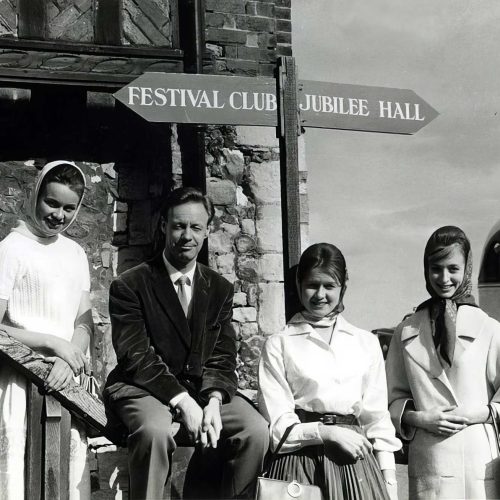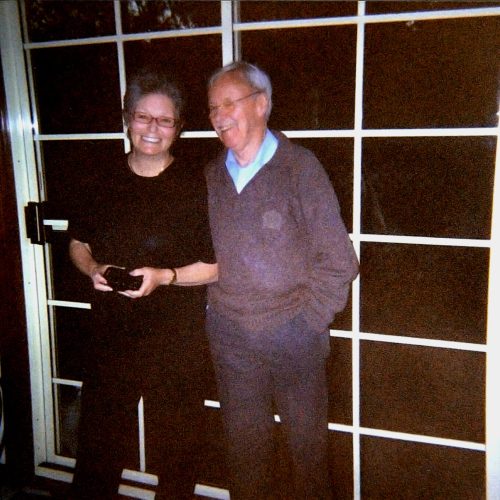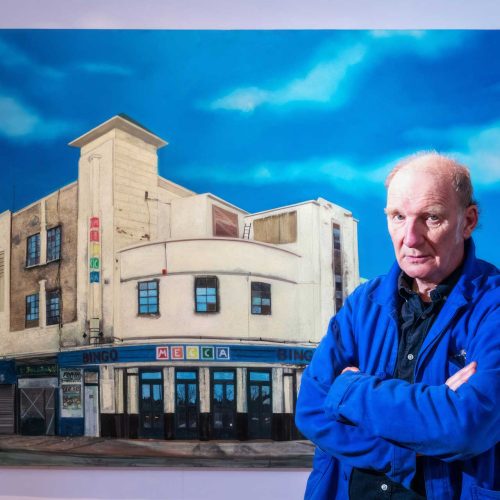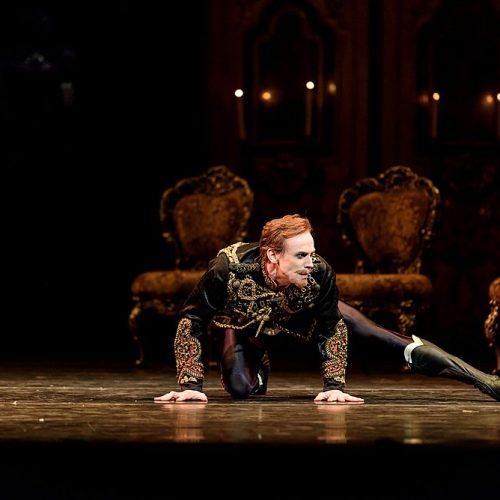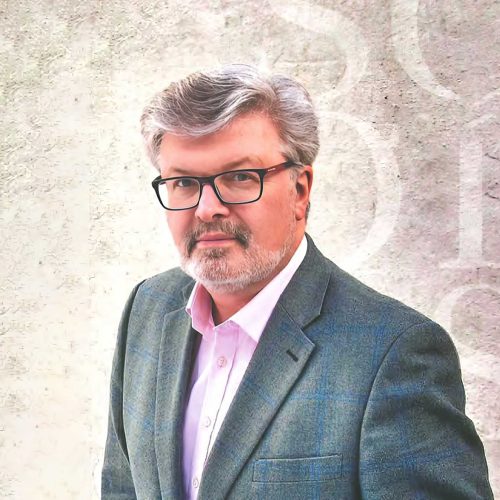Dudley Simpson
This self-effacing, straightforward man with a twinkle in his eye is known for his compositions for many TV dramas in the 1960s and 70s, including Doctor Who. Perhaps surprisingly, this career started in ballet. Dudley Simpson recounts to Patricia Linton how he travelled from Australia to the Royal Opera House where, with virtually no preparation, he conducted the orchestra of over 70 players, for a ballet performance of Coppélia. Dudley explains how this turned out.
The episode is introduced by the conductor Barry Wordsworth.
First published: July 26, 2023
Biography
Dudley Simpson was born in Melbourne in 1922 and showed an early musical talent. At the age of 13 he won a piano competition for a radio station, and became its official accompanist. While excelling at improvisation, he also studied musical theory, including orchestration and composition. His studies were interrupted by five years military service in the Australian army, after which he started working for the Borovansky Ballet (the fore-runner of The Australian Ballet), first as a pianist and then as assistant conductor and, in 1957, as its musical director.
As a result of working in Australia with Margot Fonteyn and a group of ballet dancers from the UK, Simpson decided to go to London. He worked first as a ballet pianist, but in 1959 began to conduct the Royal Opera House Orchestra in ballet performances, becoming its principal conductor from 1960 to 1963. This involved a considerable amount of touring in Europe and the Middle East, with Fonteyn and Rudolf Nureyev leading the company. In 1963, Simpson arranged Lizst’s B minor sonata for Frederick Ashton’s ballet Marguerite and Armand.
By 1964, he had already started working for television. Simpson began the work for which he is best known, the incidental music for Doctor Who. This involved composing and directing the music for 62 stories over nearly 300 episodes. Simpson’s involvement with Doctor Who continued until 1980. During this period he worked on many other television series, including The Brothers, Blake’s 7, The Tomorrow People and Tales of the Unexpected. He also composed symphonic music and music for two ballets, A Winter Play for Sadler’s Wells Royal Ballet and Ballet/Class for the The Royal Ballet School. Simpson retired in 1987 and returned to Australia, where he died in 2017, aged 95.
Transcript
In conversation with Patricia Linton
Dudley Simpson: I think I was age 4, or something, and they gave me a piano to play on at my grandfather’s place.
Patricia Linton: When were you born?
Dudley Simpson: In 1922.
Patricia Linton: In Melbourne?
Dudley Simpson: Yeah. They asked me to sit down at the piano – they’d tell me at the time that I played the national anthem with one finger almost perfectly. That’s how it started and I played the piano virtually by ear for several years. Then they had me taught and I played the piano for some time and then my father introduced me to Leslie Curnow in Melbourne who was a theoretical man. He taught me theory of music. And I got into theory of music. It’s been the background of my music, really, all these years.
I was playing at a radio station in Melbourne, a kids programme, and I was accompanying all the kids. And I had to play everything – my brother was a jazz maniac, so he’d say to me well you can play jazz – you’re a classic player, you see. And so I had to learn to accompany all the people who want to play jazz or sing songs popular songs of the day. That taught me an awful lot.
So that’s how I was going until the war and then I enlisted in Melbourne and served in the Army for five and a half years, came home and they gave me a scholarship. You could do ‘tools of the trade’: if you wanted to become a carpenter, the authorities would provide you with the tools and where to go to study. They sent me to a conservatory of music in Melbourne. I wanted to learn to orchestrate and I worked with a man named Elford Mack in Melbourne and he taught me to orchestrate for a couple of years. Then he sent me up to Sir Bernard Hines at The Conservatorium and said, ‘Have a look at his work.’ So he gave me a scholarship, and I did a diploma of music scholarship. This is where ballet comes in, because I was playing in a restaurant trying to make money. I was playing in a little string quartet with piano, you know, in The Australia Hotel, you know, Palm Court stuff and I was playing solo in this restaurant and this little fella came up to me and said, ‘Have you ever seen the ballet?’ And I said, ‘No.’ And he said, ‘Well,’ he said, ‘you’d be good at playing for classes because you can improvise. RAD [Royal Academy of Dance] stuff,’ he said, ‘is all boring’. He said, ‘You can play something original, that’s what they want’.
And so he introduced me to Madam [Xenia] Borovansky who ran the big studio [Melbourne Academy of Russian Ballet] in Melbourne. And I played piano for her for ages until ‘Boro’ [Edouard Borovansky] came in and heard me.
Patricia Linton: And immediately kidnapped…..
Dudley Simpson: He said you’re in the company and made me assistant conductor and pianist. I had no idea how to conduct but I played piano in the orchestra and I watched the conductor and learned a few tricks and a few musicians helped me. Then one day, in Sydney, we were doing Waltzes of Vienna and he, ‘Boro’, said to me, ‘Look he won’t, the conductor won’t give you a chance,’ he said, ‘But I’m telling you you’re on! You’re going on at the matinée and you’re going to do The Waltzes. And I said, ‘Okay’.
So I went on and the boys said, ‘Oh, look who’s here.’ And so I conducted and Eugene Goosens’ wife was there in the audience and she came round and she said to me, ‘And good for you…’ That was the only compliment that I’d had. But that was a start.
And then he eventually made me musical director in about 1955-56, or something, and soon after that Margot [Fonteyn] and her troupe came out with Michael Somes, Bryan Ashbridge and Rowena Jackson.
Patricia Linton: A group …a concert group?
Dudley Simpson: Yeah. And so they .. Also Borovansky put on Swan Lake, like, to include them. In that.
Patricia Linton: And so it wasn’t a separate thing they were actually going to dance with the Borovansky Ballet.
Dudley Simpson: Yes, But they did solos as well you know and duos and things like..
Patricia Linton: Divertissements?
Dudley Simpson: That is so, yeah, that sort of thing. And so that was quite exciting and that’s when I got to know Margot and Michael and she said to me, ‘You should be in Britain. You’re wasting time here with these second-class orchestras’, see. And they were. We only had about 28 in the band if we were lucky. I asked ‘Boro’, ‘Can I have a bigger orchestra. I mean this great woman’s coming and I’ve got 28 …’. He said, ‘Who’s Margot Fonteyn?’. That’s the sort of thing he was, you know. So I had to cope with that.
So we put it on and Margot was thrilled to bits and eventually we pushed off to England in one of the breaks. We [the Borovansky Ballet] couldn’t go on … The company couldn’t go on permanently because we didn’t have a repertoire. We’d go on and take a couple of years and then take six months off to regroup and build up another repertoire and start again. So in that six-month interim we all, about a dozen of us pushed off to England.
Patricia Linton: First of all, it’s quite interesting that you took to playing for class for dancers so easily. Because, I mean, traditionally it’s ever so hard finding pianists for ballet. How how did you do that so easily?
Dudley Simpson: Oh, I loved it when I got to London. I had people like David Blair and and what’s his name … the South African guy. Their names just escaped me.
Patricia Linton: David Poole..?
Dudley Simpson: Yeah …
Patricia Linton: They were queuing up for you, I should think.
Dudley Simpson: Well, they were saying, ‘at the end when we finish this enchaînement, give me a turn’. And I’d go, ‘Right …bang … brrrrrrrrrrrrrrrrrrrrrrrrrrrrrrrrrr!’ Keep on going to till they fell over, you know!
Patricia Linton: How did you?
Dudley Simpson: I just loved it.
Patricia Linton: How did it happen, ’cause you hadn’t seen any ballet at this point?
Dudley Simpson: No, that’s right. So, Madame Borovansky was very good. She’d say to me, ‘Now, 2/4 please’, and I’d go ‘oompah, oompah’ you know, just what she wanted, and then I’d make a tune to it that’s all. And it was pretty easy because you have to do eight this way and eight that way. And until Miro’s lot came along. Miro came and he said… he did this enchaînement I said, ‘but you’ve got seven on that side and nine on…’ He said, ‘Why not?
Patricia Linton: Is this Miro Zolan?
Dudley Simpson: Yes. ‘Why not!’. So we had to do seven and nine.
Patricia Linton: Another thing I just quickly want to ask you about the conducting. So you moved very quickly into conducting. Again, you seem to take it up quite confidently?
Dudley Simpson: When we got to England I couldn’t get a job anywhere except I started playing piano for classes. Andrew Hardie. Great fun but it never got me anywhere. Until one day, Bryan Ashbridge took me up to the Opera House introduced me to Hugo Rignold who was then musical director and he said, ‘Dudley is a ballet conductor’. Because he [Rignold] didn’t care for conducting for ballet much. He used to argue across the stage with the artists, I remember it very well and ’cause Ashbridge used to sit me in the audience.
Patricia Linton: Because he [Rignold] didn’t like what the dancers were doing?
Dudley Simpson: Yeah. He didn’t want to agree with what they wanted to do. He wanted to just play the music. And so he said, ‘Well, if you’re a ballet conductor how would you like to go on on Tuesday,’ and I thought oh, no, Saturday. And I said, ‘This is Tuesday’. He said, ‘Yes’. He said, ‘And tonight you can come and watch me conducting it and then you can have a score sit up in the box. Watch me and then you can do it on Saturday’.
And I thought, ‘For heaven’s sake!’ You know, I had a band of 28 in Melbourne. That’s all I ever had. And there were 75 in this orchestra and I thought …
Patricia Linton: And this was in the [Royal] Opera House?
Dudley Simpson: Yeah. What am I going to do? And I walked out at the matinée.
Patricia Linton: Butterflies, you had?
Dudley Simpson: I don’t know how I felt. I think I was nervous to start but once I started …. it all went… and the leader, Charles Taylor, said to me, ‘What is this?’ I said, ‘Well I’m conducting you this afternoon.’ He said, ‘Well, the best of British luck’.
Patricia Linton: And how did it go? What was it?
Dudley Simpson: I said, ‘Well, I might need it’. He said, ‘Get on with it.’ Coppélia with Nadia Nerina as Swanhilda and Facade. And so I thought, looking at this orchestra – you know, miles down and down there. A bit of a risk, wasn’t it? I mean if I had an accident and gone wrong somewhere, had to stop and start again.
Patricia Linton: Hugo must have seen something in you.
Dudley Simpson: No, it was only just talking, like we are now. He didn’t check me or anything. Didn’t, didn’t know anything about my credentials except that I’d conducted for Fonteyn in Australia. Anyway, erm, the first thing in Coppélia is a roll on the timpani and I looked at the score and I thought, uh-oh, where’s the drum? Where is he? And I looked to the right and there he is waving his stick. ‘Here I am, down here’. And Tony Tunstall, the lead horn, said, ‘I’m here.’ So, that was next, the horns you see so off we went and we’re going on. And then comes the big czardas you know ‘Um de dumm dum dum de dah’ that one. And I thought, ‘This will be good’ . So I went, ‘Vaaaaaaammmmmm!’ and crash! The noise! There were about five percussion players – they only had one in Australia – and nearly blew me off the rostrum. Ah dear.
Patricia Linton: How did it go?
Dudley Simpson: We went right through without a mistake. It was quite incredible except one little thing. In the little waltz. You know. Da, da, dum, da da diddly om pom pom. That one. Well, there’s an introduction to that – there are six basses, you see, in front of me all lined up waiting for them to go [into] their pizzicato and the horns over there, they answer it, and it goes, ‘dun, dong, bon bahn’, Six times, see. And I did five and I thought I’d finished and they went ‘Bom-dah!’. Tony Tunstall held up the horn. ‘Got him!’
We got on pretty well, and then, they’ve never forgotten. We were in London not too long ago and I was talking to one of the players and he said ‘I’ll never forget that day you were thrown out there like Daniel in the lion’s den,’ and he said, ‘Didn’t we do well?’
The transcript of this podcast may have been lightly edited for ease of reading.

